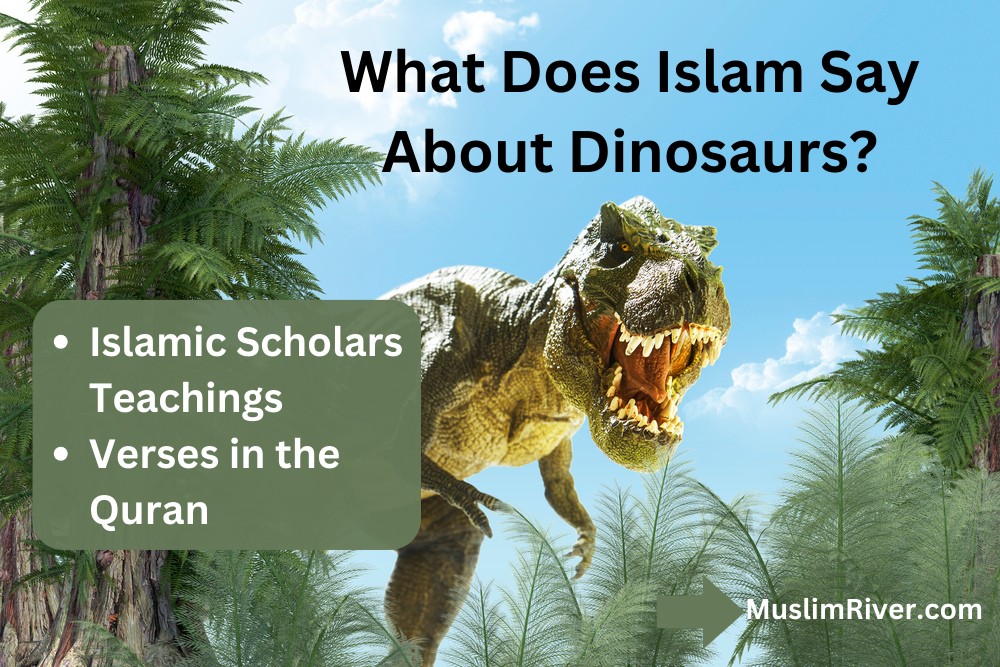What Does Islam Say About Dinosaurs?
In the vast tapestry of Islamic belief, where verses from the Quran and teachings from the Hadith provide guidance on matters ranging from ethics to the afterlife.
There exists an intriguing gap—a void that has sparked curiosity among the faithful and the scientifically inclined alike.
This void, interestingly, is about creatures that once roamed our planet millions of years ago: dinosaurs.
An intriguing intersection of religious belief and science arises when considering the existence of dinosaurs, a topic not explicitly mentioned in the Quran or Hadith.
This absence, however, by no means indicates that Islam is silent on the subject.
In this exploration of the intersection between faith and science, we delve into the mysteries surrounding dinosaurs within the context of Islamic belief.
As we embark on this exploration of what Islam says about dinosaurs.
- We’ll delve into Islamic interpretations of creation.
- Existence of ancient creatures.
- How these perspectives harmoniously coexist with scientific understanding.
Together, we’ll uncover a harmonious coexistence of faith and scientific wonder that demonstrates the depth and adaptability of Islamic worldview.
Bridging the gap between religious doctrine and paleontology.
Join us on this journey as we seek to answer the question: What Does Islam Say About Dinosaurs?

Dinosaurs in the Context of Islamic Belief. What does Islam say about dinosaurs?
This intriguing question has led to various discussions and interpretations within the Islamic community, as scholars explore the compatibility of Islamic beliefs with scientific discoveries about prehistoric creatures.
Some have questioned how dinosaurs fit into the Islamic belief system, given their absence in religious texts.
However, it is important to note that the Quran and Hadith are not meant to be comprehensive textbooks on every aspect of creation and history.
Instead, they offer guidance for living a moral and ethical life.
There are several verses in the Quran that allude to the existence of creatures.
For example, in Surah Al-Naml, it is mentioned that Prophet Sulaiman (Solomon) had control over the wind and the jinn (spirits), as well as animals such as birds and ants.
وَوَرِثَ سُلَيْمَـٰنُ دَاوُۥدَ ۖ وَقَالَ يَـٰٓأَيُّهَا ٱلنَّاسُ عُلِّمْنَا مَنطِقَ ٱلطَّيْرِ وَأُوتِينَا مِن كُلِّ شَىْءٍ ۖ إِنَّ هَـٰذَا لَهُوَ ٱلْفَضْلُ ٱلْمُبِينُ
“And David was succeeded by Solomon, who said, “O people! We have been taught the language of birds, and been given everything ˹we need˺. This is indeed a great privilege.”
[Surah Al-Naml (Chapter 27), Verse 16] Source: Surah Al-Naml, Verse 16 on Quran.com
حَتَّىٰٓ إِذَآ أَتَوْا۟ عَلَىٰ وَادِ ٱلنَّمْلِ قَالَتْ نَمْلَةٌۭ يَـٰٓأَيُّهَا ٱلنَّمْلُ ٱدْخُلُوا۟ مَسَـٰكِنَكُمْ لَا يَحْطِمَنَّكُمْ سُلَيْمَـٰنُ وَجُنُودُهُۥ وَهُمْ لَا يَشْعُرُونَ
“And when they came across a valley of ants, an ant warned, “O ants! Go quickly into your homes so Solomon and his armies do not crush you, unknowingly.”
[Surah Al-Naml (Chapter 27), Verse 18] Source: Surah Al-Naml, Verse 18 on Quran.com
This implies that there were other species inhabiting the earth at that time.
Additionally, verses in Surah Al-Anaam and Surah Al-Anbiya describe the diversity of creatures on earth, indicating that it is not limited to just humans.
وَمَا مِن دَآبَّةٍۢ فِى ٱلْأَرْضِ وَلَا طَـٰٓئِرٍۢ يَطِيرُ بِجَنَاحَيْهِ إِلَّآ أُمَمٌ أَمْثَالُكُم ۚ مَّا فَرَّطْنَا فِى ٱلْكِتَـٰبِ مِن شَىْءٍۢ ۚ ثُمَّ إِلَىٰ رَبِّهِمْ يُحْشَرُونَ ٣٨
“All living beings roaming the earth and winged birds soaring in the sky are communities like yourselves.1 We have left nothing out of the Record.2 Then to their Lord they will be gathered all together.“
[Surah Al-Anaam (Chapter 6), Verse 38] Source: Surah Al-Anaam, Verse 38 on Quran.com
أَوَلَمْ يَرَ ٱلَّذِينَ كَفَرُوٓا۟ أَنَّ ٱلسَّمَـٰوَٰتِ وَٱلْأَرْضَ كَانَتَا رَتْقًۭا فَفَتَقْنَـٰهُمَا ۖ وَجَعَلْنَا مِنَ ٱلْمَآءِ كُلَّ شَىْءٍ حَىٍّ ۖ أَفَلَا يُؤْمِنُونَ ٣٠
“Do the disbelievers not realize that the heavens and earth were ˹once˺ one mass then We split them apart? And We created from water every living thing. Will they not then believe?“
[Surah Al-Anbiya (Chapter 21), Verse 30] Source: Surah Al-Anbiya, Verse 30 on Quran.com
This sets the foundation for an understanding that there may have been other creatures, such as dinosaurs, living on earth before humans.
This aligns with scientific evidence that suggests dinosaurs roamed the earth millions of years ago.
However, it is important to note that the concept of time in Islam is not linear, but rather cyclical.
According to Islamic belief, the earth has gone through cycles of creation and destruction multiple times before humans came into existence.
Therefore, dinosaurs may have existed during one of these previous cycles.
Resolving the Conflict between Faith and Science
What does the Noble Quran say about the creation of the world and the creatures that inhabit it, including dinosaurs, and how do Islamic scholars reconcile these teachings with scientific discoveries?
In the Noble Quran, which is a source of guidance for millions, there are references that shed light on the creation of our world and the creatures that inhabit it.
It speaks of “earth mountains standing firm” as a testament to the stability and balance of our planet.
Within its verses, there are mentions of “created beasts” showcasing the diversity of life on Earth.
While the Quran primarily addresses the creation of human beings, it doesn’t specifically mention dinosaurs.
While there may not be direct references to dinosaurs in the Quran, the Islamic perspective encourages the pursuit of knowledge and understanding of the natural world, allowing for a harmonious coexistence of faith and scientific exploration.
Islamic scholars have engaged in discussions about the compatibility of Islamic teachings with scientific discoveries, including the existence of dinosaurs.
Scientific Miracles in the Holy Quran
The Holy Quran, revered as the sacred scripture of Islam, is believed by many to contain verses that allude to various scientific phenomena, including the existence of creatures that could be interpreted as dinosaurs.
While the Quran does not explicitly mention dinosaurs, some proponents of the theory of scientific miracles in the Quran argue that certain passages can be related to these ancient creatures.
Here are a few examples:
- Creation of Diverse Life Forms: The Quran repeatedly emphasizes the diversity of creatures and life forms on Earth.
This concept aligns with the existence of various prehistoric species, including dinosaurs, which could be seen as part of the diverse creation mentioned in the Quran. Islam Creation Story - Earth’s History of Creation and Extinction: Islamic belief holds that the Earth has gone through cycles of creation and destruction before the existence of humans.
This cyclical nature of creation and destruction could provide room for the existence of dinosaurs during one of these past cycles. Four Billion Years of the Earth’s History Summarized by Prophet Muhammad – Al Jumuah Magazine - Signs in Nature: The Quran often refers to natural phenomena as signs of God’s creation and wisdom. Fossils and evidence of ancient creatures like dinosaurs can be seen as these signs, encouraging believers to seek knowledge and understanding of the natural world. The Connection Between Nature and the Divine
It’s important to note that the concept of scientific miracles in the Quran is a matter of interpretation, and not all Muslims or scholars agree on these connections.
Believers who see these references as hints of dinosaurs in the Quran often do so as a way to harmonize their faith with scientific understanding.
However, these interpretations remain a subject of debate and may vary among individuals and Islamic scholars.
Frequently Asked Questions
What Religion Does Not Believe in Dinosaurs?
Most religions do not specifically address the existence of dinosaurs as their holy texts were written well before the concept of dinosaurs was introduced.
As such, the belief in dinosaurs usually depends on individual interpretation of religious texts and not the religion itself.
However, certain branches of Christianity, mostly found among fundamentalist creationists, have been known to reject the existence of dinosaurs, or interpret their existence in a way that aligns with a literal interpretation of the Bible’s creation story.
What Does Islam Say About Evolution?
Islam’s view on evolution varies significantly among believers.
While the Quran does not explicitly reference the concept of evolution as understood today, it does discuss the creation of life and humanity.
Some Muslims interpret these passages as supportive of evolution, viewing it as one of the processes set in motion by Allah.
Others, however, reject the theory entirely, particularly the aspect concerning human evolution, as they believe it contradicts the Quranic narrative of Adam’s creation.
It’s important to note that these interpretations depend largely on individual or cultural perspectives, and are not universally agreed upon within the Islamic community.
Conclusion
In conclusion, it is not a matter of whether or not religion and science can coexist, but rather understanding that they both offer unique perspectives on the world we live in.
As believers, we should embrace the wonders of creation and continue seeking knowledge to deepen our faith and understanding.
Let us not be afraid to explore new discoveries and expand our understanding of the universe with a faith-driven mindset.
As Prophet Muhammad (peace be upon him) said, “The seeking of knowledge is obligatory for every Muslim.”
May Allah guide us all on this journey towards wisdom and enlightenment. Ameen.






